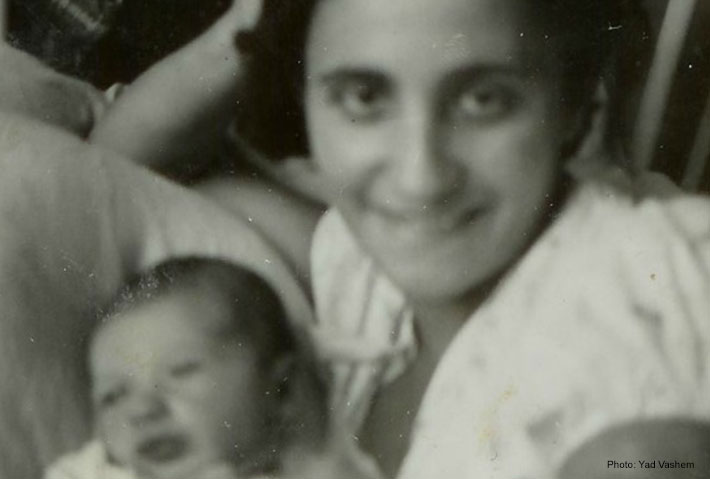Theodor had entered the Bedzin ghetto bravely wearing a yellow armband – disguising himself as a Jew – in order to help the Jewish people being held there. When Sara and Yechiel gave their daughter to the kindly Polish man, they also sent a letter, to be read when Dita grew up. It read:
My beloved and most precious child,
When I gave birth to you, I did not imagine that six and a half years later I would have to write you a letter with this content... I am taking with me your beloved image, as you have been in our home, your childish, sweet talk, the smell of your pure body, the rhythm of your breathing, your smile and your crying... I am carrying with me the terrible, abysmal fear, that cannot be relieved even for one second... Remember your grandparents, your uncles and aunts, and the entire family. Remember all of us, and please, don't blame us. And with regard to me, forgive me, forgive me, my dear child, for having given birth to you. I had wanted to bring you to the world so that you would live your life in your community, and if things turned out differently, it is not our fault. I therefore beg you, my darling baby, my only child, please don't blame us.... Another thing I want you to know is that your mother was a proud person, despite all the humiliation we suffered from our enemies, and if it is her destiny to die, she will die without protest, without weeping, with a scornful smile for her hangmen. I hug you to my heart, kiss you fervently, and bless you with all the power of a mother's heart and love.
Your mother
The Florczaks, who had four children of their own, treated little Dita like part of the family. The oldest daughter, Wieslawa, cared for Dita and taught her.
But life was always dangerous. Dita, who had blue eyes and blonde hair, could pass as a Gentile, but the Florczak family was always threatened by the Nazis. One night, Nazi soldiers barged into the home looking for hidden Jews, as someone had tipped them off. Dita was fast asleep as the cruel German soldiers stood over her. But Theodor and Jaroslawa convinced the Nazis that the child was actually German, and had been sent to them to avoid the Allied bombing of Berlin. Satisfied, the Nazis left. But for six weeks, Dita was sent elsewhere until the situation had subsided.
At the same time, the ghetto had been liquidated and Sara and Yechiel Gerlitz were deported to separate death camps. God protected the two parents, though. Sara barely survived typhus at Bergen-Belsen (the same disease that would claim the life of Anne Frank, also at Bergen-Belsen). Yechiel survived the death march from Buchenwald to Dachau before being liberated by the Allies.
When Yechiel made his way to the Florczaks' town, he was distraught to hear that their house had been destroyed by bombs and that the family was dead. He kept asking, and learned they had moved to a different street, where he found a sign on the mailbox that read "The Florczak family and Dita Gerlitz."
After being reunited with her father, young Dita would not let him out of her sight. And each night she prayed for her mother's safe return.
At last, Sara recovered from her coma, which had been caused by typhus, and found her husband and daughter. The family made aliyah (immigrated) to the Holy Land. The Gerlitzes keps in touch with the Florczak family, sending hem money, medicine, and other packages. In 1962, their daughter's rescuers visited Israel.
And in 2010, Theodor and Jaroslawa Florczak were named Righteous Among the Nations by Yad Vashem for the selflessness and love they showed in saving the life of a beloved and precious little Jewish girl.



